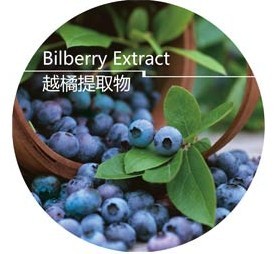Products
Contact us
- Changsha Herbal Ingredient Co.,Ltd
- Tel: 0086-731-88250818
- Add:No.56,Zhanxing Rd,Changsha,China,410205.
 sales@herbal-ingredient.com
sales@herbal-ingredient.com CHI-extracts
CHI-extracts

Bilberry Extract /Anthocyanins
Latin Name:Vaccinium Myrtillus L
Active Ingredient:Anthocyanins UV-VIS
CAS No:84082-34-8
Specification:25%Anthocyanins
MOQ:1kg
Lead Time:Within 7days after confirming order
Bilberry Extract
Latin Name:Vaccinium Myrtillus L
Active Ingredient:Anthocyanins
CAS No:84082-34-8
Specification:25%Anthocyanins Tested by UV-VIS
MOQ:1kg
Lead Time:Within 7days after confirming order
Bilberry Extract Information:
Bilberry grows abundantly in the mountainous areas of Europe. The bilberries are extracted and concentrated to fortify the anthocyanins levels. Anthocyanins are the coloring agents in the skin and juice of the bilberry.
Bilberry Extract main active ingredient:anthocyanins anthocyanosides Vaccinium myrtillus L
History:
Bilberry has been used for centuries, both medicinally and as a food in jams and pies. It is related to the blueberry and is native to Northern Europe. Bilberry fruit contains chemicals known as anthocyanosides, plant pigments that have excellent antioxidant properties. They scavenge damaging particles in the body known as free radicals, helping to prevent or reverse damage to cells. Antioxidants have been shown to help prevent a number of long-term illnesses such as heart disease, cancer, and an eye disorder called macular degeneration. Bilberry also contains vitamin C, which is another antioxidant
Vaccinium myrtillus L. fruits contain the highest amounts of anthocyanins in comparison with other berries such as Vaccinium angustifolium.
What is Anthocyanins?
Anthocyanins are water-soluble pigments responsible for red, pink, mauve, purple, blue,or violet color of most flower and fruits. These compounds act as potent antioxidants and phosphodiesterase inhibitors,thus being particularly effective in the amelioration of capillary resistance and permeability and are widely used in dietary botanicals and pharmaceutical market for the treatment of vascular and vision disorders.
Application:
Not many studies have been done to examine bilberry specifically. Even fewer studies have been done in humans. Most of the suggestions about bilberry's effectiveness come from research on similar antioxidants, or from test tube and limited animal studies, and is used in bellow applications:
1.Chronic venous insufficiency
2.Diabetes
3.Atherosclerosis
4.Diarrhea and wounds
5.Improve Vision




